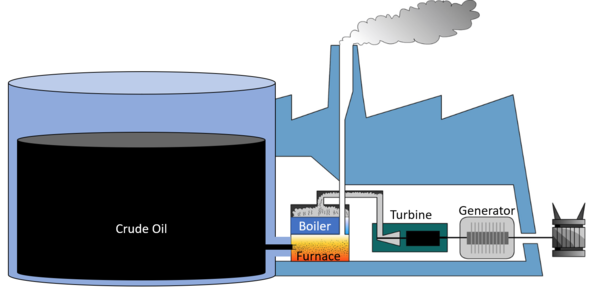Difference between revisions of "Natural Gas"
(Created page with "A gaseous Fossil fuel formed from the remains of dead plants and animals.") |
|||
| Line 1: | Line 1: | ||
| − | + | ==Key Stage 3== | |
| + | ===Meaning=== | ||
| + | '''Natural Gas''' is a [[Gas|gaseous]] [[Fossil fuel]] formed from the remains of dead [[Plant|plants]] and [[Animal|animals]]. | ||
| + | |||
| + | ===About Natural Gas=== | ||
| + | : [[Natural Gas]] is a [[Non-renewable Energy Resources|non-renewable energy resource]]. | ||
| + | : [[Natural Gas]] has [[energy]] in its [[Chemical Potential Energy Store|chemical potential energy store]] which can be transferred into a [[Thermal Energy Store|thermal energy store]] by [[combustion]]. | ||
| + | |||
| + | ===Power=== | ||
| + | : [[Natural Gas]] can be used to provide [[power]] directly buy burning it in homes and in furnaces or it can provide power by generating electricity. | ||
| + | {| class="wikitable" | ||
| + | |- | ||
| + | |[[File:CrudeOilPowerStationDiagram2.png|center|600px]] | ||
| + | |- | ||
| + | | style="height:20px; width:200px; text-align:center;" |A [[diagram]] of a [[coal]] [[power station]]. | ||
| + | |} | ||
| + | : 1. Natural Gas is burned in a furnace. | ||
| + | : 2. Water is heated in a boiler by the burning gas. | ||
| + | : 3. Water turns to steam and passes down pipes to turn a turbine. | ||
| + | : 4. The turbine causes a generator to spin. | ||
| + | : 5. The generator makes an electrical current. | ||
Revision as of 09:00, 8 October 2018
Key Stage 3
Meaning
Natural Gas is a gaseous Fossil fuel formed from the remains of dead plants and animals.
About Natural Gas
- Natural Gas is a non-renewable energy resource.
- Natural Gas has energy in its chemical potential energy store which can be transferred into a thermal energy store by combustion.
Power
- Natural Gas can be used to provide power directly buy burning it in homes and in furnaces or it can provide power by generating electricity.
| A diagram of a coal power station. |
- 1. Natural Gas is burned in a furnace.
- 2. Water is heated in a boiler by the burning gas.
- 3. Water turns to steam and passes down pipes to turn a turbine.
- 4. The turbine causes a generator to spin.
- 5. The generator makes an electrical current.
